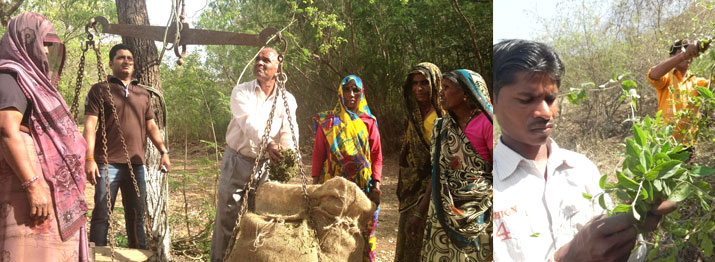GFP's Sustainable Ecosystem
Fostering sustainability, social and economic development in the community with a commitment to give back to nature.
Since its creation, GFP has been involved in sustainable development and has taken special care to preserve the raw materials it sources everyday from nature.
Till the late 80’s GFPL partnered with the Government to lease forest lands to sustainably harvest Accacia trees. GFPL now actively participates in public auctions to source raw material as well as organizes its own collection to source raw material sustainably and ethically.
We focus on the areas of environment, health, education, and economic development.
Education
The Company is committed to giving back to the community through education. Towards this end, Happy Days School was started on the GFPL campus 25 years back to provide quality education to the children of Shivpuri and the neighboring villages. The school has 2000 students enrolled of which 400 students from the surrounding villages and the tribal community are given education free of cost.
www.happydaysschool.org |
 |
Health
GFP as a part of its CSR initiative runs a free Ayurvedic clinic for the community.
|
Environment
In a water-starved area, water conservation is key driver for the area. Our water treatment plants recycle the used water and make it effective to be used in our cooling towers as well as to maintain a green campus. We have made an enormous effort to harvest rainwater and utilize it to recharge our underground water resources.
Cultivation: To preserve the natural habitat and avoid the danger of overharvesting and destructive collection practices, the company has initiated a medicinal plants cultivation project. |
Social and Economic Development
Our company is located in the forested  heartland of central India rich in medicinal plants where as per government policy wild crafted medicinal plants are collected by the tribal (adivasi) community. GFP works closely with the tribal community for their economic and social development and education. We source our raw material directly from the tribal communities and hold regular training session for good collection practices with th em. heartland of central India rich in medicinal plants where as per government policy wild crafted medicinal plants are collected by the tribal (adivasi) community. GFP works closely with the tribal community for their economic and social development and education. We source our raw material directly from the tribal communities and hold regular training session for good collection practices with th em.
We have adopted two Sahariya tribal villages Kathmai and Binega and regularly interact with the community there. The tribal population of Sehriyas has remained in the same condition that they were in fifty years ago. They face a multitude of problems from water scarcity, poor health care, lack of income generation opportunities, malnourishment. Amongst our various initiatives in these villages, we have built a wall around the government school and water tanks, a kitchen, done tree plantations, hygienic bathing and toilet facilities and donated sweaters and clothes to the children every year. We encourage the children from the tribal community to study and provide them with free education and food in the school.
|
Economic Development
- Source of regular income for local tribal populations
- Enables farmers to add value to their crop, in a weak ecosystem and guarantee of crop buy back
- Creation of valuable, stable and secure jobs
 Social Development Social Development
- Long-term relationships with suppliers
- Maintaining of a local workforce in rural areas
- Tribal population settlement to work in jobs related to collection of forest products
- Tribal mobility through education
- Technical training for local employees and tribal community
Environmental Protection
- Soil preservation and water conservation, ecosystem enrichment
- Environmentally-friendly, organic farming
|
|

 Social Development
Social Development


 heartland of central India rich in medicinal plants where as per government policy wild crafted medicinal plants are collected by the tribal (adivasi) community. GFP works closely with the tribal community for their economic and social development and education. We source our raw material directly from the tribal communities and hold regular training session for good collection practices with th em.
heartland of central India rich in medicinal plants where as per government policy wild crafted medicinal plants are collected by the tribal (adivasi) community. GFP works closely with the tribal community for their economic and social development and education. We source our raw material directly from the tribal communities and hold regular training session for good collection practices with th em.